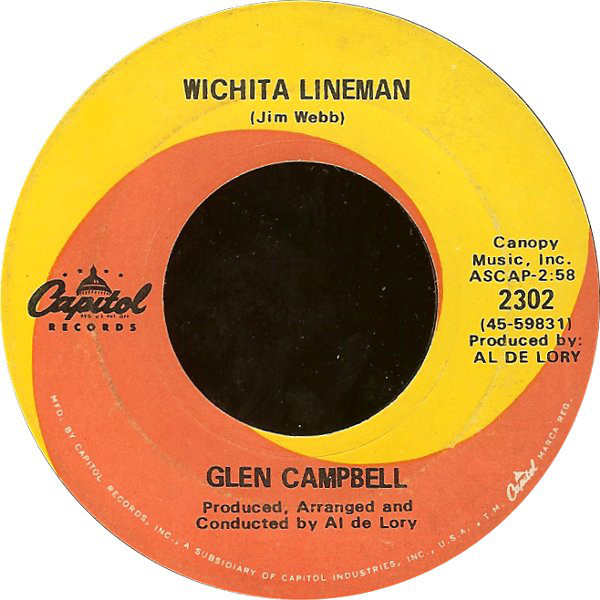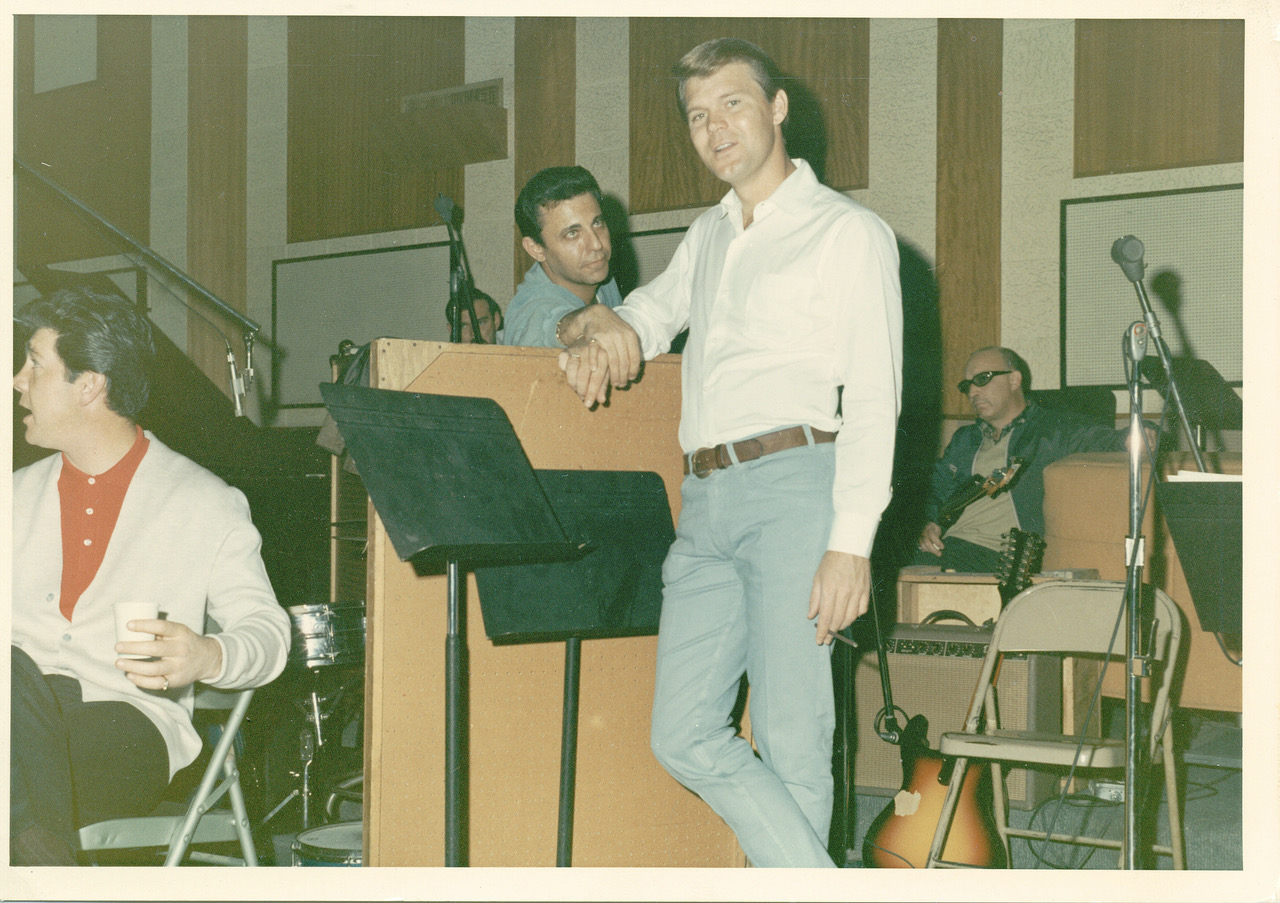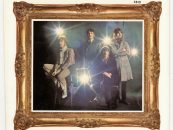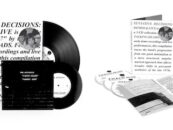Glen Campbell’s ‘Wichita Lineman’: Achingly Beautiful
by Best Classic Bands Staff
“Wichita Lineman,” recorded by Glen Campbell and written by “Jim Webb,” was released in October 1968
One of the great songwriter/singer collaborations is that of Jimmy Webb and Glen Campbell. Webb, born on August 15, 1946, is one of the most successful and honored songwriters of our time and his rise paralleled the growth of the pop era of the ’60s. A partial list of tunes he penned includes “Up, Up and Away” (the Fifth Dimension), “The Worst That Could Happen” (The Brooklyn Bridge), “MacArthur Park” (Richard Harris, Donna Summer) and a trio of hit singles for Campbell: “Galveston,” “By the Time I Get to Phoenix” and “Wichita Lineman.”
Campbell, who died at 81 on August 8, 2017, established himself as a session player for the Los Angeles-based studio musicians known as the Wrecking Crew. He then forged a singing and recording career from the late 1960s into the ’70s with mass-market multi-genre pop appeal through a string of Top 10 and #1 songs, and found success on television and acting in movies.

Glen Campbell with drummer Hal Blaine at a Wrecking Crew session (Photo: Denny Tedesco archives; used with permission)
Related: 13 times when Glen Campbell rocked
Webb has said that the first single he ever bought was Campbell’s 1961 single “Turn Around, Look At Me,” which was a modest hit. Six years later, the collaboration took hold with “By The Time I Get To Phoenix.” Though the song peaked at only #26 on the pop chart, it reached #2 on country radio. In December 1968, the collaboration reached its apex with “Wichita Lineman,” which became the singer’s second of five career #1 country hits and a #3 pop smash. Campbell’s album of the same name also topped both the country and overall sales chart.
Related: Our interview with Jimmy Webb, who says he wrote “Wichita Lineman” specifically for Campbell
Listen to the studio version
The musicians on the song, including the beautiful string arrangement? None other than the Wrecking Crew, specifically Al Casey, James Burton, Carol Kaye, Don Bagley, Jim Gordon and Al De Lory. And although the song has been covered dozens of times by the likes of Johnny Cash, James Taylor, Robert Goulet and Kool & the Gang, it’s Campbell’s achingly beautiful version about the loneliness of the county utility worker that remains the signature version.
Campbell, born April 22, 1936, was 32 years old when he recorded the song.
For its inspiration, Webb thought back to an indelible image he had etched in his memory that he once saw while driving through rural Oklahoma of a solitary lineman working on a telephone pole in an endless line of poles and the loneliness and longing that a man like that might feel. On deadline to deliver the song, Webb turned in a version that he felt was unfinished, warning producer and arranger Al De Lory that he needed to add a third verse. Unbeknownst to him, Campbell, who said he cried upon hearing it because he was homesick, recorded it immediately, adding a bass guitar interlude to complete the song. Webb initially assumed that Campbell didn’t like the song since he hadn’t received any feedback so was surprised to find out from Campbell when he ran into him several weeks later that he had recorded it.
Watch Campbell perform the song on The Glen Campbell Goodtime Hour
The recording earned Grammy nominations for Record of the Year and Best Male Contemporary Pop Vocal Performance.
Campbell’s Wichita Lineman album – his 12th – first hit #1 on the Billboard chart on November 30, 1968.
On March 25, 2020, the single was added to the National Recording Registry of the Library of Congress. Each year, songs are deemed worthy of preservation because of “their cultural, historic and aesthetic importance to the nation’s recorded sound heritage.”
“I’m humbled and, at the same time for Glen, I am extremely proud,” said Webb. “I wish there was some way I could reach him to say, ‘Glen, you know they’re doing this. They are putting our music in a mountain–it will be preserved for all time.”
If you’re a new Best Classic Bands reader, we’d be grateful if you would Like our Facebook page and/or bookmark our Home page.
And one more clip from when Campbell and Webb visited The View for an interview and performance of “Lineman.”
Campbell’s recordings are available in the U.S. here, in Canada here and in the U.K. here.







7 Comments so far
Jump into a conversationThe interlude is not a bass guitar; it’s just the lower strings on a regular guitar. Witness Campbell’s solo in the second video.
Actually, the solo is played on a baritone guitar. It has six strings like a regular guitar, but they’re all tuned an octave lower. That’s how it gets that great low-end sound.
Jimmy Webb is a national treasure. His songs are hauntingly beautiful and very deep. I saw Glen on his last tour and when he sangs Webb’s “Didn’t We” people were openly weeping. I have never been more moved in a concert than in that moment.
Dylan calls it the BEST song ever written. That is a monumental endorsement.
Glen’s videos get me every time….
That wonderful and original interlude over the third verse of “Wichita Lineman” is neither a bass or the low strings of a regular guitar, as KJeff mentions above. It’s a rarely used or heard instrument called a Baritone guitar, which uses thicker strings and sound much lower than a guitar but is not quite a bass. I’ve seen video’s of Cambell play his regular guitar over the break with his band while his other guitar player played the solo on a baritone. But it’s the baritone that’s heard so clearly on the popular recording.
I’d like to make a correction on my own statement about the baritone guitar. It’s a six-string guitar with a longer neck length — like a bass but uses the same guitar strings as a regular guitar that are able to be tuned down to get that lower sound (like a drop-tuning), while the neck length allows the normal guitar’s string tension to be maintained.
— the best line ever written in a song — “and I need you more than want you……and I want you for all time …..”